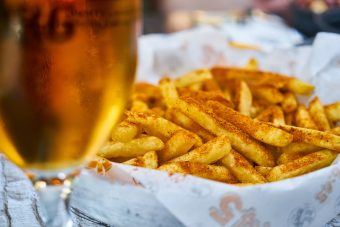Climate change has fueled raging wildfires around the world, bleached coral reefs and intensified hurricanes—and now it’s coming for Europe’s fries.

A hot and dry summer has caused low potato yields in Belgium and across Europe, resulting in sad, stubby fries or “frites”—up to an entire inch shorter than the 3-inch norm. The news gets worse: If Europeans were planning to wash down those salty frites with a cold Belgian beer, then they need to think again. There might also be a shortage of the brew due to an expected decrease in barley yields.
The culprit behind these inconveniences: climate change. Europe has seen record high temperatures and droughts this summer because of climate change. Potato crop yields are down 25 percent from previous years, and barley (a primary ingredient in beer) yields are expected to fall up to 40 percent.
“The fact that climate change threatens the small things that make our daily life a happy one reminds us that we have a responsibility to tackle climate change and its impacts in the world,” said Herbert Lust, vice president of Conservation International Europe.
This problem is bigger than a hefty bar tab: Climate change is already reducing yields of wheat, rice, coffee and cocoa. Agriculture is dependent on weather patterns, and climate change is directly influencing them, resulting in droughts in already dry regions of the world and floods in regions that already receive enough rain.
Deforestation is one of the greatest contributors to climate change, and 80 percent of deforestation is due to agricultural expansion. In other words, the way food is produced and consumed contributes to a negative cycle that harms the environment and results in less food. Soy, palm oil, beef, coffee and cocoa products that are imported by major economies account for a large portion of this problem. Global demand for these products is booming, and this high demand threatens the very ecosystems that we need to protect to avoid the most catastrophic effects of climate change.
Conservation International is tackling these challenges by designing landscapes that are sustainable, which means they prevent deforestation and ecosystem degradation while also improving the livelihoods of local communities. Another important part of our work involves training farmers in more sustainable agricultural practices to improve productivity without further degrading the environment.
“Farming communities will be hit hardest by climate change, particularly in the poorest countries,” said Fanny Gauttier, manager of European Union Policy and Sustainable Production for Conservation International. “It is urgent that we recognize the significant impact our use of land has on the environment if we have any hope of adapting to and mitigating climate change.”
“The situation with frites and beer is just a taste of what’s to come.”
Source: Eco Watch

